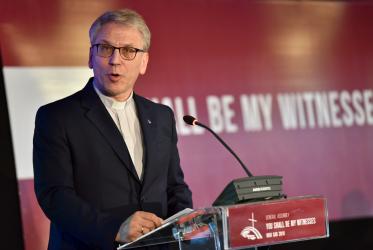Église évangélique slovaque de la confession d'Augsbourg en Serbie et au Monténégro
This church is the largest Lutheran church in former Yugoslavia, speaking the Slovak language. Each congregation is governed by a local council, the entire church by a synod. The bishop is the spiritual head. Its largely rural membership is located in the autonomous province of Vojvodina on the plains south of the Hungarian border. It was earlier a part of the Lutheran Church in Hungary, but upon the creation of Yugoslavia, it became an autonomous church, with head¬quarters in Novi Sad. Its pastors are educated at the Lutheran theological faculty in Bratislava, along with those of the Evangelical Church of the Augsburg Confession in the Republic of Slovakia.
In 1967, this Yugoslav church body was joined by the then 7,000-member Evangelical Church in the People's Republic of Serbia, composed of Hungarian Lutherans. Prior to 1918, that small body had also been part of the Lutheran Church in Hungary. Between the world wars, it was part of the German Lutheran Church in Yugoslavia, but after 1945 it became an independent church. As it is located between the Hungarian border and Novi Sad, its merger with the larger Slovak church made sense, although linguistic differences required adjustment. In recent years, the believers and descendents of the Hungarian Lutherans have become independent of the Slovak Evangelical Church of the A.C. and joined their own church, named the Evangelical Christian Church in Serbia/Montenegro with headquarters in Subotica.
A growing challenge for the Slovak Evangelical Church of the A.C. is maintaining the Slovak identity in a majority Serbian environment. A Slovak translation of the Bible, completed in the 1970s in Czechoslovakia, is widely used. Close links continue to be maintained with the much larger counterpart and namesake of the church in the Republic of Slovakia.


